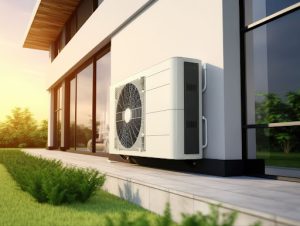Heat pumps have become a buzzword in the world of energy-efficient home heating and cooling systems, often hailed as a win-win for both homeowners and the planet. But are they truly the eco-friendly and cost-saving solutions they claim to be? Let’s explore how heat pumps significantly reduce energy costs while lowering environmental impact, thanks to their energy efficiency, reduced carbon footprint, and dual-functionality, as well as the financial incentives of choosing a heat pump, such as rebates and tax credits.
How Do Air-Source Heat Pumps Work?
Unlike traditional heating and cooling systems that generate heat or cold, heat pumps simply transfer these air temperatures. During winter, heat pumps extract warmth from outdoor air (or the ground, depending on the type) and move it indoors to warm the spaces. In summer, the process reverses, expelling heat from your home to keep it cool. This energy transfer process uses far less electricity than conventional systems, making heat pumps a more sustainable option.
What Are the Benefits of Air-Source Heat Pumps?
Heat pumps are a true win-win, providing both energy savings and environmentally friendly operations. Let’s look at how they achieve both:
1. Greater Efficiency: Lower Energy Expenditure, Bigger Savings
One of the biggest advantages of heat pumps vs. furnaces is their impressive energy efficiency. As one of the most efficient heating systems, heat pumps can deliver up to four times more heat energy than the electrical energy they consume. This efficiency translates directly to significant homeowner cost savings.
- Year-Round Efficiency: One system can replace both a furnace and an air conditioner, saving energy throughout the year.
- Reduced Electricity Bills: It’s one of the cheapest ways to heat (and cool) a home. By harnessing electricity more effectively, heat pumps can lower monthly energy bills by as much as 50%, depending on the climate and type of system installed.
Takeaway: Heat pumps can replace a furnace and an air conditioner, significantly lowering both heating and cooling costs.
2. Reduced Carbon Footprint: Greener Operations
Heat pumps don’t just save money – like other ecological heating options, they also play a vital role in reducing greenhouse gas emissions. Unlike fossil fuel-based systems, heat pumps rely on electricity, which can be generated from renewable sources like wind or solar.
- Lower Direct Emissions: Heat pumps do not burn fossil fuels like natural gas or oil, resulting in zero onsite carbon emissions.
- Future-Proofing: As electric grids transition to cleaner energy sources, the environmental benefits of heat pumps will grow even more substantial.
Takeaway: Like other ecological heating systems, installing a heat pump is a meaningful step toward a greener future.
Related: Eco-Friendly Plumbing: Water Conservation Tips for Every Home
3. Dual Functionality: Ease of Use, Consistency, and Maintenance
A standout feature of heat pumps is their ability to provide both heating and cooling from the same equipment. This dual functionality not only saves space and makes operations simple, but also streamlines maintenance.
- Consistent Comfort: Heat pumps are known for maintaining consistent indoor temperatures, creating a comfortable living environment regardless of the season.
- All-in-One Solution: Homeowners no longer need separate systems for heating in winter and air conditioning in summer. By consolidating these needs into a single efficient system, heat pumps reduce the environmental footprint associated with manufacturing, operating, and maintaining multiple systems.
- Easy Maintenance: With one unit handling two operations, maintenance is easier and more cost-effective.
Takeaway: A heat pump’s ability to provide consistent heating and cooling in one unit reduces its environmental footprint and maintenance burden.
Financial Incentives: Rebates and Tax Credits
Are these benefits worth it? Heat pumps can seem like a significant upfront investment. However, rebates and tax credits often offset the initial costs. Many governments and utility companies recognize the environmental benefits of heat pumps and offer attractive financial incentives to encourage adoption.
- Federal Tax Credits: In the U.S., homeowners can claim up to 30% of the buying and installation costs for qualifying heat pumps under the federal Energy Efficient Home Improvement Credit.
- Local Rebates: State and local governments, as well as utility companies, frequently offer rebates for installing energy-efficient systems. To optimize your energy savings, see EnergyStar.gov for government-certified products.
- Long-Term Savings: While the upfront cost of a heat pump can be higher than traditional systems, the combination of rebates, tax credits, and lower energy bills results in a system that pays for itself over time.
Before purchasing an air-source heat pump, check with your local energy provider and government agencies to see what incentives are available in your area. With these benefits, heat pumps become one of the cheapest ways to heat a home.
Challenges and Considerations
While air-source heat pumps are a win-win for many, it’s important to consider a few challenges:
- Climate Suitability: In extremely cold climates, air-source heat pumps may struggle to extract enough heat from the air, although modern models with advanced technology have greatly improved in this area.
- Upfront Costs: Despite financial incentives, heat pumps can still require a higher initial investment compared to traditional systems.
- Proper Sizing and Installation: To maximize efficiency, heat pumps must be correctly sized and installed, which requires professional expertise.
These factors highlight the importance of researching and consulting with HVAC professionals before making a decision.
Are Air-Source Heat Pumps Right for You?
If you’re looking to save money on energy bills and reduce your environmental impact, heat pumps are a compelling option. Their energy efficiency, low carbon footprint, and dual functionality make them a practical and eco-friendly choice for homeowners seeking long-term value. The availability of financial incentives like rebates and tax credits further sweetens the deal, making heat pumps more accessible than ever.
Related: HVAC Industry Trends and How They Can Affect You
Talk With Superior HVAC & Plumbing About Adding a Heat Pump to Your Home
Heat pumps do deliver on their promise of being a win-win for energy costs and the environment. With significant savings on electricity bills, reduced reliance on fossil fuels, and a comfortable home year-round, they’re an investment in both your wallet and the planet.
If you’re considering upgrading your home’s heating and cooling system with an air-source heat pump, it’s a great time to take advantage of available incentives. Contact Superior HVAC & Plumbing for expert advice and assistance in finding the perfect solution for your home and budget.

